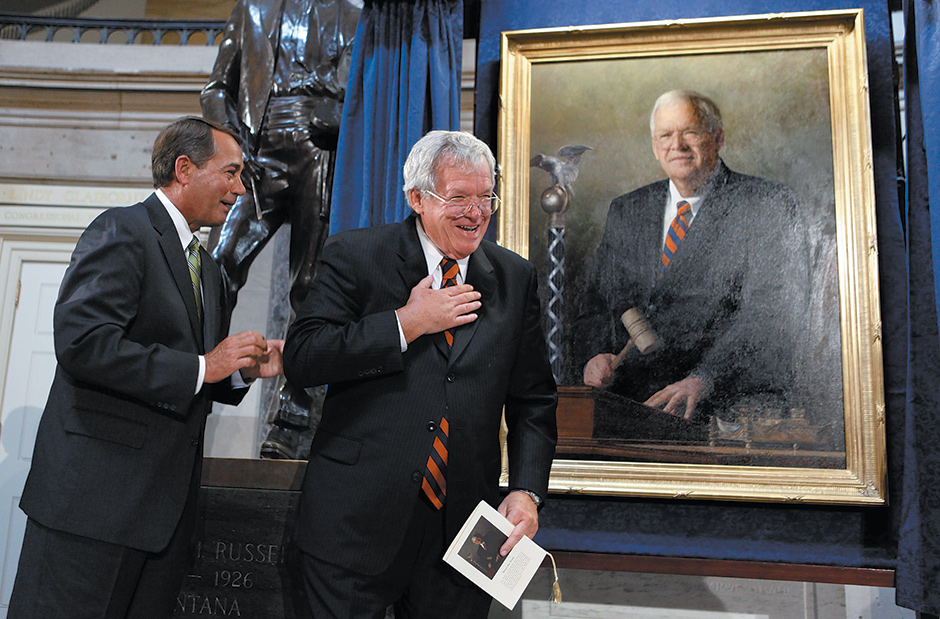Between his indictment on May 28 and his court appearance on June 9, at which his lawyer entered pleas of innocence on his behalf, almost nothing was heard from Dennis Hastert, the former Republican Speaker of the House. He had been accused by the government of violating money-laundering laws and lying to the FBI about doing so. He had allegedly been withdrawing large sums from his own bank accounts, paying off a character referred to as Individual A, in compensation for some past “misconduct.” According to the indictment Hastert tried to evade requirements that withdrawals of over $10,000 be reported to the government; and he lied to the FBI about his use of the money he had withdrawn.
Almost immediately after the indictment the authorities anonymously leaked the additional information that Individual A was male and that the misconduct was of a sexual kind. It had taken place, according to the leaks, when Hastert was a teacher and wrestling coach in Yorkville, Illinois, sometime between the years 1967 and 1981. The payments belonged to a much later period, beginning after a meeting with Individual A in 2010, two years after Hastert had joined a Washington law and lobbying firm. In other words, if Hastert’s past misdeed had involved a minor, the compensation arrangements were allowed to wait thirty-odd years until the Speaker had cashed in on his experience and contacts and become a very well-paid lobbyist.
The large sums of money allegedly demanded of Hastert—$3.5 million, of which about half had already been paid—have convinced many people that a really disgraceful secret was being covered up. At that price, it must have been something truly—and here the writer instinctively reaches for a rare word—truly heinous. But we don’t know the facts and it seems unwise to calibrate the heinousness of the misdeed on a straightforward dollar scale. Hastert, confronted with this figure from his past, could have panicked in private, without recourse to sober advice. Or he could have made a cool, realistic assessment of his potential loss of future earnings if a relatively minor offense (for anyone else) undermined his reputation for probity, such as it was.
What is clear is that he quickly has been made an unperson. His lucrative jobs evaporated. There have been demands to remove his portrait from the Capitol. His name was removed from a public policy center at Wheaton College he had helped found. He became a byword for hypocrisy. The hush money could have been more about the desperate future he faced than the embarrassing past.
Some commentators have allowed their pens to run away with them. Here is Josh Marshall of Talking Points Memo on June 1: “Needless to say, I’m not trying to portray Hastert as a victim here. It seems very likely that he’s guilty of some very dark crimes.” I thought “very dark crimes” was language better reserved for Srebrenica or Babi Yar. And why is it needless to say that Marshall is not trying to portray Hastert as a victim? Hastert himself (it seems to have been the only thing we have heard from him) is said to have told close friends that he was sorry people had to go through this ordeal. “I am a victim, too,” he told them.
This reported remark was treated with some derision at Talking Points Memo and elsewhere. Generally speaking, more effort has gone into imagining Hastert’s dark crimes than into picturing the activities of the extortioner, about whom amazingly little has surfaced. We know that Hastert mishandled the payment of the hush money, and an article in Mother Jones went so far as to explain various ways in which he could have made the payments and escaped the notice of the law. He could have given Individual A a Picasso, for instance.
But what that article never considers is that perhaps Hastert made the cash payments in a bungling way because this is the way Individual A insisted they be made. We are told that Hastert inquired from a colleague about the possibility of setting up a substantial annuity. But perhaps Individual A did not want the money to be paid as an annuity, just as he did not want a Picasso or other valuable work of art, the selling of which he might find difficult. Perhaps, too, the risky and worrisome handing over of large sums of cash had its own punitive charm from the point of view of Individual A.
The invisibility of Individual A is itself very striking. It may be that we heard his voice in the clip to which C-SPAN drew attention after Hastert’s arrest. It comes from an appearance by Hastert on Washington Journal in November last year. The listener is identified as Bruce from Illinois. “Hello Denny,” he says cheerfully, and then “Remember me from Yorkville?” before laughing and apparently hanging up. Whoever this is, and whatever his motive in calling in, it is hard to believe that there are not many people out there who would recognize his voice and know exactly who Bruce is.
Advertisement
The same could be true of Individual A (whether or not he is the same person as Bruce). There must be many people out there who can make at least an educated guess about who he is. But neither his identity nor his behavior has hitherto been an issue. The federal prosecutors have obtained a court order to protect his anonymity; information “marked as sensitive” is to be kept under seal on the conclusion of the case. As a report summarized the court order: “The materials turned over in discovery should either be destroyed, returned to the government or retained in the defense counsel’s file still under seal.” There has been no sign that Individual A will face charges for blackmail, or that his handling of large sums of cash—$1.7 million by the time Hastert was indicted—has been held to be felonious in any respect. It is as if the large sums of money, as soon as they left Hastert’s hands, lost their radioactivity. They became uncontroversial in the eyes of the law.
What is Hastert being prosecuted for, and is it the same thing as what he is being punished for? If he is being punished for the large “structured” withdrawals of cash from his own bank accounts, then why should the involvement of Individual A not come under public scrutiny as well? The same question can be asked if he is being punished for lying: Was the correct answer to the FBI’s question “I was paying off Individual A”? It is only when one posits the hypothesis that Hastert is being punished for sexual abuse of a minor, many years ago, that the protection offered to Individual A makes sense. But it seems that that putative case cannot be brought to the court.
Very few people seem to have a problem with the idea that Hastert could be prosecuted for one thing and punished for another. Alan Dershowitz was among the few protesters:
This case just smells…. I’m shocked that a prosecutor would allow this kind of case to be brought knowing that it will reveal the secrets, that it would open doors up to things that are alleged to have occurred almost half a century ago.
The statutes about structuring cash withdrawals, Dershowitz said, “were intended to prevent money laundering, to prevent drug dealing, to prevent income tax evasion.” But the payment of hush money is not illegal and it
is not within the heartland of what this statute was intended to cover. And then to have an indictment which essentially reveals that which Hastert was trying to conceal puts the government in the position of essentially being part of the blackmail—and it’s just not right.
Then there is the question of the lie that Hastert is alleged to have told. The indictment describes it like this: “Specifically, in reponse to the agents’ question confirming whether the purpose of the withdrawals was to store cash because he did not feel safe with the banking system, as he previously indicated, JOHN DENNIS HASTERT stated: ‘Yeah…I kept the cash. That’s what I’m doing.’” This is the response that, over and above the matter of the withdrawals themselves, could earn Hastert up to five years in prison and a $250,000 fine for lying to the FBI. Essentially he was going along with a version of the facts that the agents themselves had put to him, based on something he had previously said (although exactly how he expressed himself earlier we are not told).
Hastert is in his mid-seventies. One could imagine that a certain panic had set in, and that the explanation offered by the agents seemed like a way out. One could also imagine a world in which Hastert had demanded to have a lawyer at his side before he replied. But if the case is not about an old man being blackmailed, but about allegations of sexual abuse long ago, then different rules seem to apply. (The sister of another student of Hastert’s, who is now dead, made such an allegation after the indictment.) We enter a much rougher world in which the accused is essentially on his own.
Here, for instance, is Jeffrey Toobin of The New Yorker:
While the payments to Individual A are probably legal, no prosecutor in the world is going to give the benefit of the doubt to someone who is making a payoff based on an apparent gross abuse of trust by a teacher against a student. It is exactly this kind of underlying fact that would—and should—motivate a prosecutor to proceed in a close case.
Here we see the scary quasi-legal process set forth and praised for its effectiveness. The “underlying fact” is the alleged “apparent gross abuse of trust by a teacher against a student”—even though that gross abuse of trust is not mentioned as such in the indictment, but only sketched out in the anonymous briefings of the press the next day. The indictment itself says that “during at least one of [their] meetings, Individual A and defendant discussed past misconduct by defendant against Individual A that had occurred years earlier”—and that Hastert “agreed to provide Individual A $3.5 million to compensate for and conceal his prior misconduct against Individual A.”
Advertisement
Toobin informs us that Hastert told the FBI “two preposterous lies.” Here they are: “First, he said that he was withdrawing the money to keep for his own use, even though he was passing it to Individual A.” Well, Toobin seems to have invented much of the wording here. The second preposterous lie: “And second, Hastert said that he removed the cash from the bank because he did not feel safe with the American banking system—which is just absurd, especially for a former Speaker of the House.” Once again, this is not the response as it appears in the indictment, which is only: “Yeah…I kept the cash. That’s what I’m doing.”
Two preposterous lies? Or one weak moment under pressure? Five years in prison for saying “Yeah…I kept the cash”?




